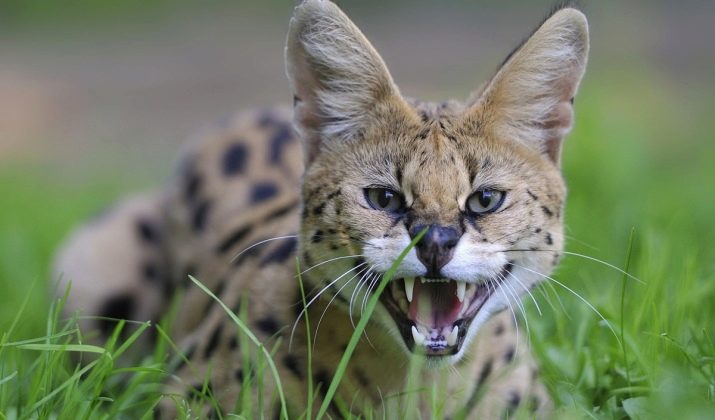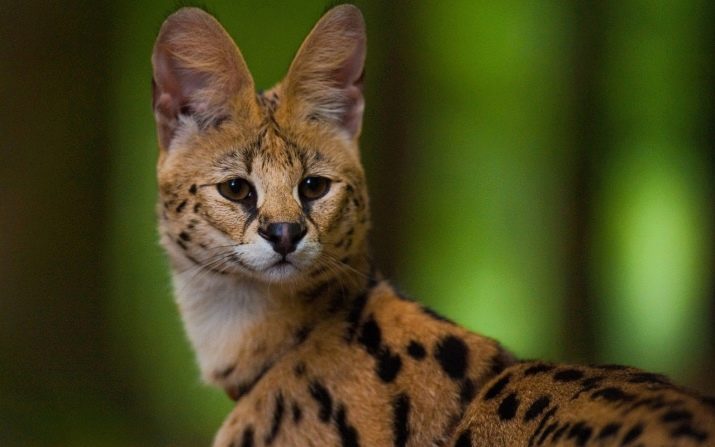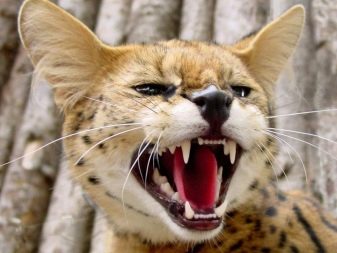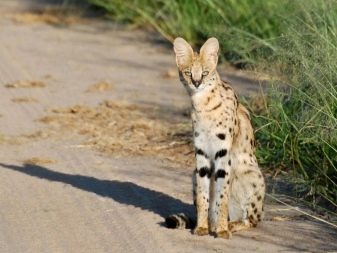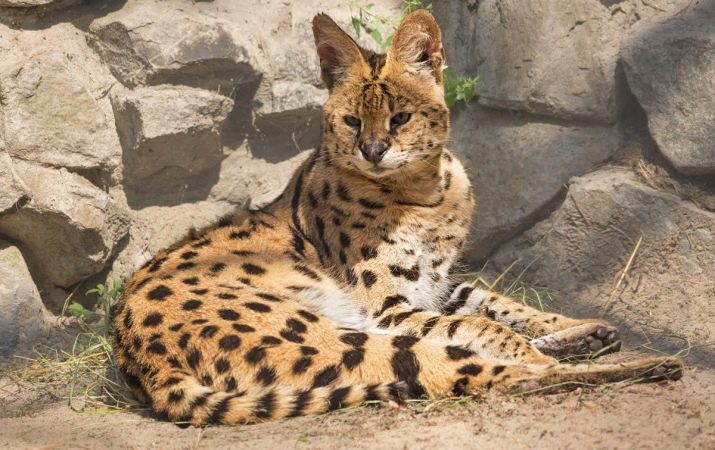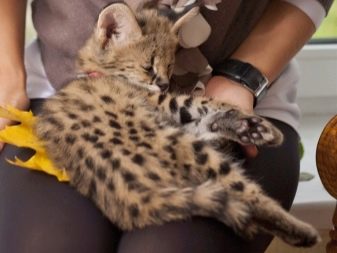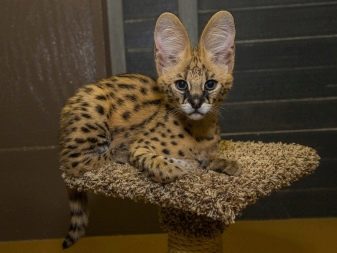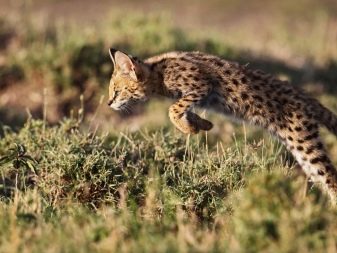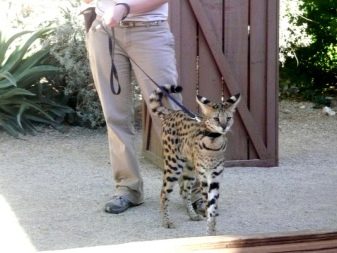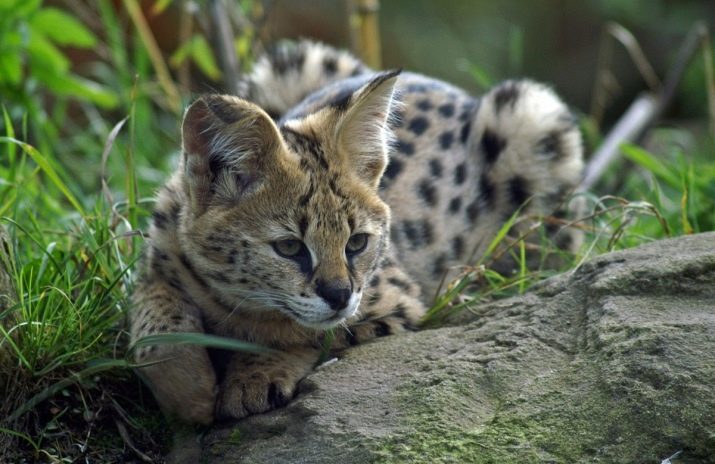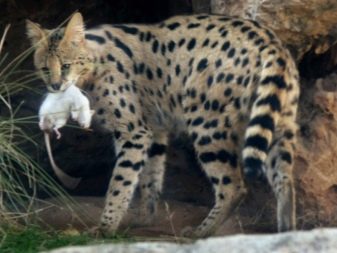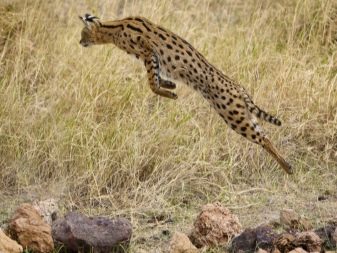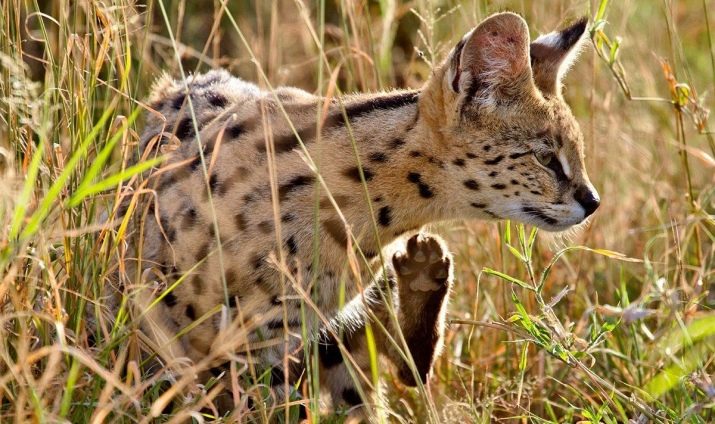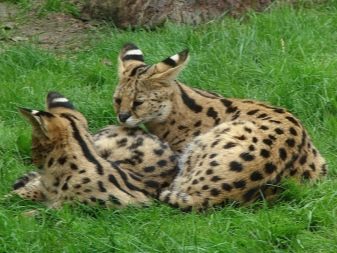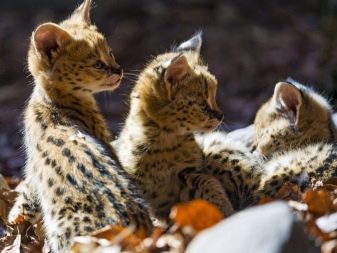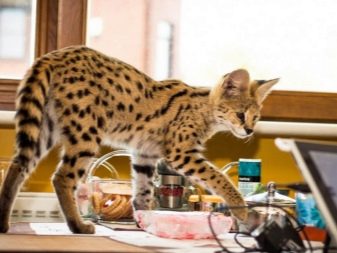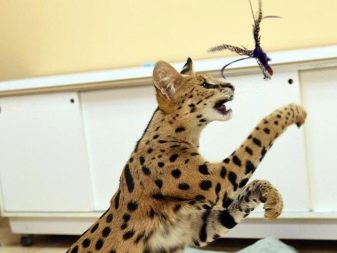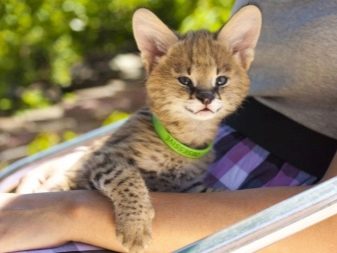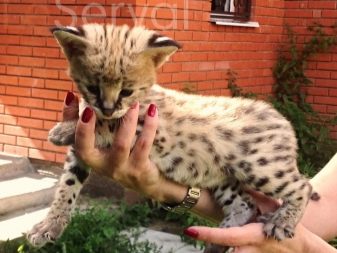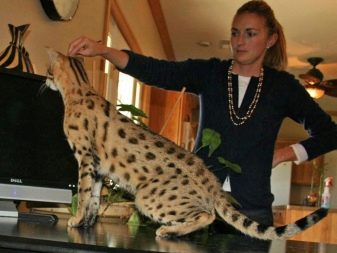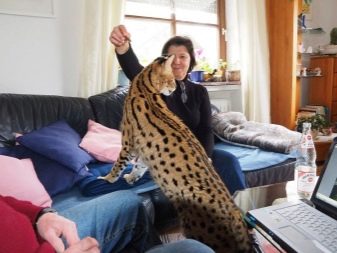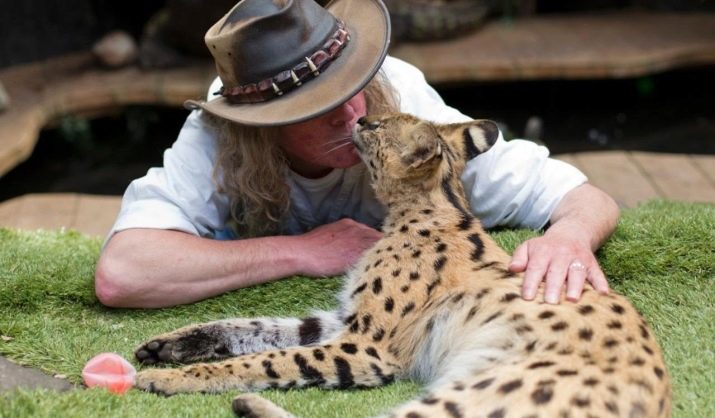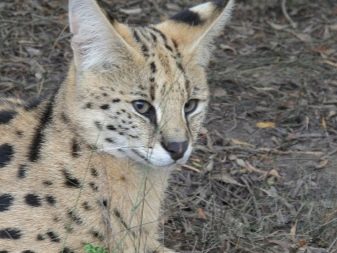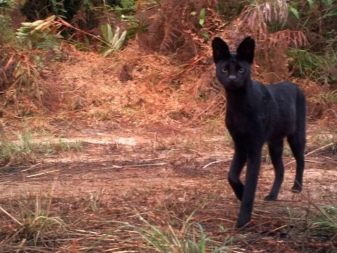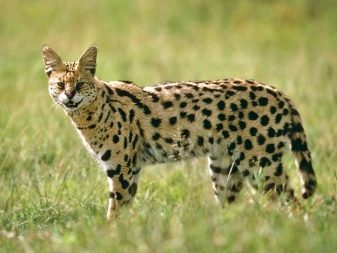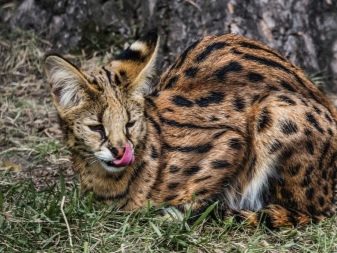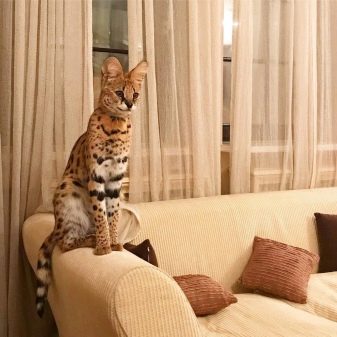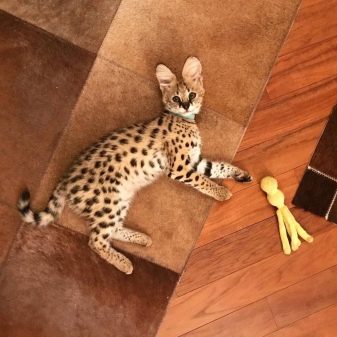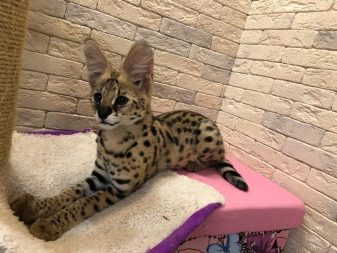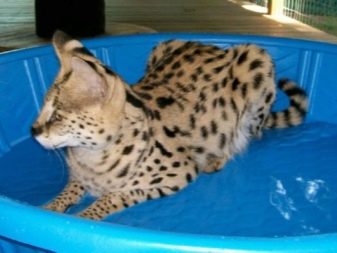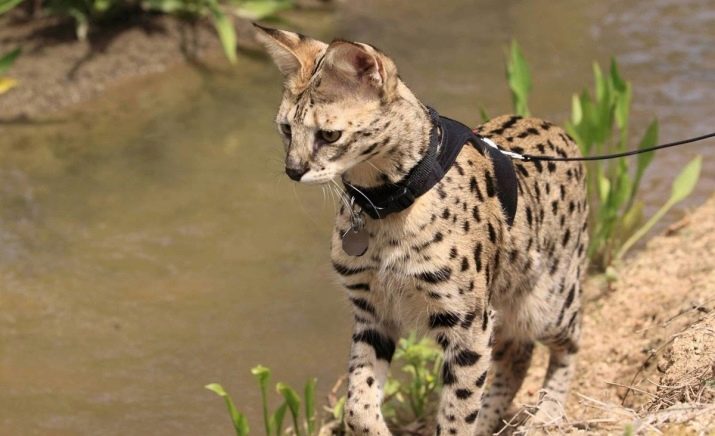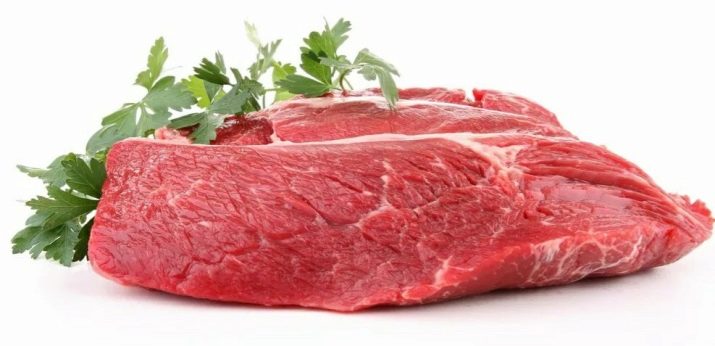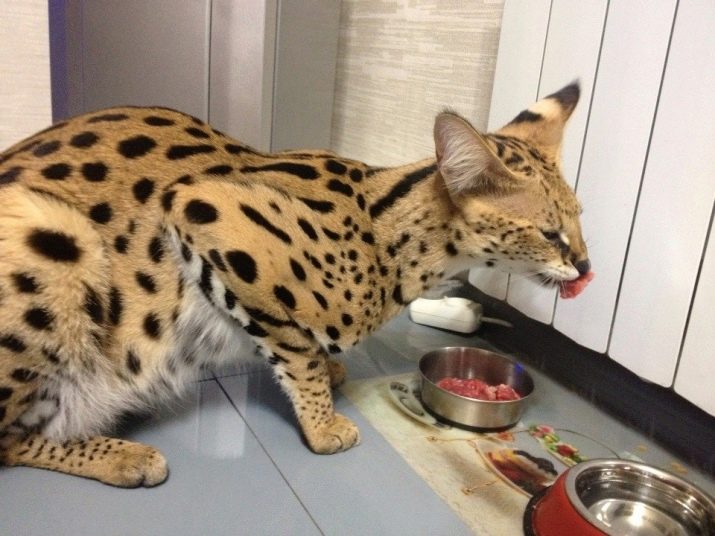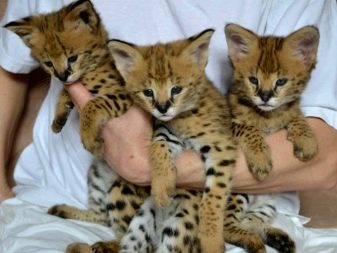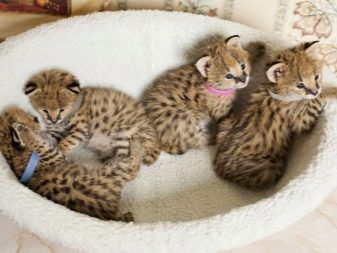Serval: description, color options, especially the content and feeding
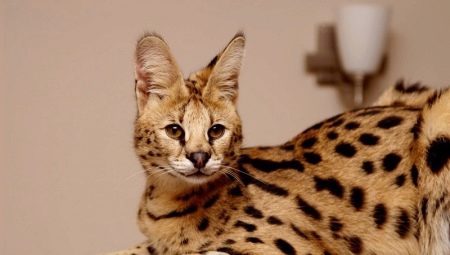
For many years, pets are not only loved and funny animals that bring a huge amount of positive emotions and joy, but also an indicator of the financial level. Representatives of the well-off strata of the population give birth to very rare and expensive pets who can emphasize their material well-being. In the exotic living corners of private mansions you can often find unusual birds, animals and reptiles.
Serval, a domesticated wildcat, will be a spectacular and expensive purchase. A spotted large animal will look impressive in the leather interior of a luxury car or on a Persian carpet in the living room.
History of origin
The African Serval is a wild animal whose color resembles a cheetah. The homeland of this beast is the tropical forests of Africa. In their natural habitat, biologists have more than 10 subspecies of cats of this breed. The bright color of the fur and its high cost led to a significant decrease in the number of individuals in the natural habitat zone. In pursuit of profit, poachers began to massively catch and exterminate not only adult cats, but also kittens.
For a long time, the serval was considered exclusively a wild animal, which is not amenable to domestication and training. Professional breeders have denied this fact and were able to tame a wild cat.
Description
Serval is a graceful cat that even at home preserves the habits of a predator and looks like a cheetah. The Serval cat breed has a small head, protruding ears, which on the outside have black and white stripes. The nose and nose are massive and large. The mustache is long and tough. The eyes are almond-shaped below and in the form of a boomerang above.
In the large wide mouth are powerful long canines, whose length can reach 30 mm.
The average length of a powerful fleshy tail is 35 cm. The paws are long, thin and graceful. The maximum body size of an adult individual can reach 1 m, and the weight can reach up to 17 kg.
A distinctive feature of the animals - bright unusual color. On the sand or saturated brown body there are black spots that smoothly turn into solid lines in the back zone. On the chest and abdomen, the coat becomes white. Gentle fur has a smooth uniform structure with very short fibers.
Serval has a sensitive ear and lightning reaction. The life span of the beast at home can reach 20 years. Like any animal, the African Serval has a number of advantages and disadvantages. Advantages:
- high aesthetic performance;
- long period of life;
- lack of unmotivated aggression and inappropriate behavior;
- avoiding conflict situations;
- dog loyalty and love for the owner;
- playfulness and sociability;
- high intellectual abilities;
- aptitude for training;
- no conflict with equal animals;
- good immunity and resistance to various diseases;
- unpretentiousness to care and maintenance.
Disadvantages:
- cunning and stubbornness;
- high price range;
- incompatibility with small children;
- aggressive attitude towards small pets;
- excessive activity and constant desire to jump;
- the need for education and training;
- the presence of a constant desire to gnaw and tag everything;
- the need for a large room;
- intolerance to cry and rude attitude;
- high cost of diet;
- the need for daily street walks;
- difficulty in acquiring.
Where dwells?
The African cat is a resident of the tropical regions of Africa, Sahara, Marroko and Algeria. Animals have a negative attitude towards open areas and prefer bushes and grassy thickets near reservoirs and rivers. Serval uses edges and open areas for movement, hunts in the morning and evening hours.
To feed the cats catch rodents, birds, reptiles and large insects. For bird hunting the animal uses instant vertical jumping. To catch rodents, the cat simply digs up the habitat of the prey and extracts it from there.
Serval is a solitary animal that lives and hunts on its own. Convergence with congeners occurs only in the mating season. It is very rare to see a fight for territory between males. Each animal is on the site and does not apply for the additional area. In natural habitat, hyenas, wild dogs and leopards are the most dangerous for the serval.
In early spring, females appear offspring. In one litter can be no more than 3 kittens. The period of gestation is about 60 days.
Up to 6 months, the kittens are completely dairy-fed, at the age of six months the cat will teach the young to hunt and eat independently, and at 7 months the kittens become independent inhabitants of Africa.
Character traits
Despite the long-term maintenance in terms of apartments, the domesticated African cat retained the features of its wild ancestors to the maximum. Animals do not like undue attention, most of the time they prefer to be alone. During the period of increased activity, animals love to run, play and jump to a height of over 2.5 m.
In the zone of movement of cats should not be fragile and valuable items. These features must be considered before the acquisition Serval.
Experts recommend purchasing from trusted breeders kittens whose age does not exceed 5 months. Buying more adult cats is impractical due to the impossibility of taming already formed individuals. Availability of permits - the pledge of the purchase of a purebred animal.
Despite his wild temper, the pet is very friendly and curious. The animal is not only a home decoration, but also a reliable security guard, who, even during the rest period, keeps order on its territory. To quickly get used to the pet owners, it must be regularly fed from the hands and play on an equal footing with the beast. The list of prohibited actions:
- game with the hands and feet of the host;
- scream;
- physical punishment.
The animal has a good memory, high intelligence and sensitivity. If aggressive actions were committed in his direction, the pet will never forgive him and will, if necessary, take revenge on the owner.
A more effective punishment is loneliness, during which the cat independently realizes its mistakes and comes to apologize.
The beast must be protected from contact with young children who may offend him and provoke aggression. In the event of a conflict, an African cat will try to avoid physical contact with a rival and will simply step aside. The main task of the owner of the cat is to show the animal who is the owner of the house, and build relationships based on trust, understanding and friendship.
Color options
The classic colors of the African cat range from light beige to burgundy. Kenyan breeds may have black fur. The subspecies that live in forests are distinguished by more saturated flowers than those that are hidden in the bushes.
On the fur of most animals, you can see black spots, which turn into smooth lines on the back. Sometimes you can see instead of black spots stripes.The hair on the tail is covered with a circular pattern, and at the end there is always a black tassel. Often in the conditions of zoos white kittens with gray spots can be born.
Conditions of detention
The maintenance of Serval’s apartment is a big responsibility and complexity. Without creating a comfortable and safe living environment to keep in the house of the beast is strictly prohibited. Peak activity of pets falls on earlier morning and late evening. After a few hours of active life, pets get tired and go into the rest phase. The predatory pet must be isolated from other pets that can be easy prey for a serval.
A pet can cause considerable harm to expensive furniture, wires, paintings and other interior items, which will be bitten, marked and nibbled. To prevent damage to the interior, experts recommend purchasing special toys for cats and dogs that the serval will be busy with during the period of activity.
Experienced razvodchiki recommend to lubricate the places of increased attention of the cat with apple juice, which will scare away the predator.
A characteristic feature of the home serval is to mark your territory. An animal can perform this procedure up to 40 times per hour. The excreted liquid has a specific unpleasant odor that may disappoint the owners. If the cat moves freely around the apartment, and the owners do not plan on obtaining offspring, it is necessary to conduct a castration.
The females are sterilized at the age of 12 months, and the males - when they reach 8 months.
Young kittens quickly get used to the tray and gladly use it for the toilet. Serval has a positive attitude to regular water procedures, which will help avoid the appearance of an unpleasant odor. If the pet has no desire to bathe, it is strictly forbidden to force him. Forcing you to something will provoke negative and aggression.
Veterinarians recommend combing the hair once a week and cleaning the auricles. For combing the cat, use a pooder, a furminator for short hair, a rubber brush and a thick comb. List of daily hygiene procedures:
- teeth cleaning;
- rubbing eyes with a special lotion;
- claw length adjustment.
Serval responds positively to daily street walks on a leash in the summer. In winter and during the autumn and spring cold periods, the pet’s stay on the street should be reduced to a minimum. The animal does not tolerate drafts, strong cold air flows and sudden changes in temperature. Even with the creation of the most comfortable conditions for life, the servals may not please the owners with their offspring.
Feeding
The diet of African animals is significantly different from the traditional food of ordinary cats. For the full growth and development of Serval, its menu should consist of chicken and quail meat, beef and veal, as well as by-products. Raw meat can be combined with leaves of fresh greens, which will have a beneficial effect on the bowels. These products are as close as possible to the natural home food system.
A full balanced diet will require large financial costs from the owners of the beast. To provide the animals with mineral elements, it is necessary to use special vitamin complexes, as well as special high-quality ready-made feeds. An adult healthy animal should consume more than 500 g of raw meat product with bones per day. Quail eggs, feed mice and frogs can be a pet treat.
For the purposes of training the animal can be pampered with dry cat food.
An adult pet needs to be fed once, and young kittens should be given food 2 times a day. The animal should not have free access to products. Veterinarians recommend that after a year of life cats arrange a complete hunger strike for 1 day per month.In summer, the beast needs constant access to clean fresh water. In the diet of the beast there are practically no vegetables, fruits, roots, milk and dairy products.
It is strictly forbidden to use for feeding the meat of pigs, which can provoke the development of paralysis, rabies and infectious meningitis. Veterinarians do not recommend feeding animals with cheap granulated cat food. It consists of no more than 5% of the protein of the required 50%. Inexpensive blends contain dyes, preservatives and flavor enhancers that negatively affect digestion.
Health
The domestic African beast is distinguished by strong immunity, but it needs timely vaccination. Ignoring this procedure can trigger the development of dangerous diseases, and sometimes the death of a pet. Serve the cause of various diseases can climate change. Tropical animals do not tolerate frosts and temperature fluctuations. The most common diseases are cold and leukemia.
In the case of digestive disorders, as well as the appearance of liquid discharge, it is necessary to immediately contact a medical institution and not use traditional methods of treatment.
Due to the fragility of the bone skeleton, as well as the lack of formation of limbs in young individuals, it is necessary to limit the number of their jumps from a height. These fun can provoke damage to the paws.
Before purchasing an African kitten, all lovers of exotic animals should carefully study its character, diet and living conditions. Serval is not an ordinary domestic cat, this animal even at home remains a predator, which needs a special diet, constant attention and plenty of free space. It is necessary to buy small kittens only in well-known kennels, which can document the thoroughbredness of the breed.
In the absence of financial resources for the maintenance of the cat and enough time for its training and adaptation, it is better not to purchase a wild beast, but opt for more traditional pets.
You can learn more about the home server from the following video.
